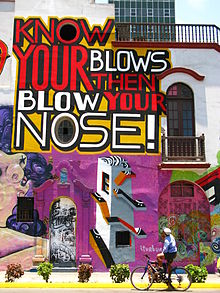
Back تلاعب بالألفاظ Arabic Joc de paraules Catalan Slovní hříčka Czech Wortspiel German Vortludo Esperanto Hitz-joko Basque بازی با واژگان Persian Sanaleikki Finnish Jeu de mots French Wurdboarterij Frisian

Word play or wordplay[1] (also: play-on-words) is a literary technique and a form of wit in which words used become the main subject of the work, primarily for the purpose of intended effect or amusement. Examples of word play include puns, phonetic mix-ups such as spoonerisms, obscure words and meanings, clever rhetorical excursions, oddly formed sentences, double entendres, and telling character names (such as in the play The Importance of Being Earnest, Ernest being a given name that sounds exactly like the adjective earnest).
Word play is quite common in oral cultures as a method of reinforcing meaning. Examples of text-based (orthographic) word play are found in languages with or without alphabet-based scripts, such as homophonic puns in Mandarin Chinese.
- ^ "definition of wordplay". Oxford Dictionaries Online. Archived from the original on 11 August 2011. Retrieved 6 August 2013.